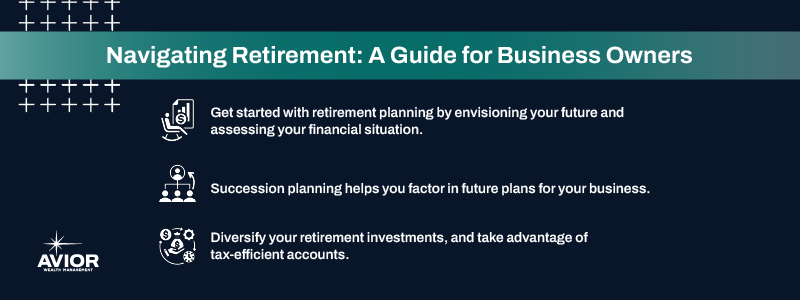Navigating Retirement: A Guide for Business Owners
It’s hard to think about retirement as a business owner. But preparing now is key to a financially secure future.

Most of your time is probably spent running and growing your business. The demands of managing employees, satisfying customers, and staying competitive can leave little room to think about your long-term financial future.
Yet, retirement planning is one of the most crucial steps to ensure that all your hard work leads to a secure and fulfilling life after you decide to step away. Retirement planning for business owners differs significantly from that of salaried employees.
Your business, often your most significant asset, plays a central role in your retirement strategy. Whether you plan to sell, pass it down, or transition to a less active role, careful preparation is vital.
1. Start With a Vision
Retirement means different things to different people. For some, it’s a chance to travel the world or pick up new hobbies. For others, it’s all about spending more time with family or contributing to charitable causes.
As a business owner, your retirement might include consulting, mentoring, or taking on a part-time role in your company.
To create an actionable retirement plan, start by answering questions such as:
- What do I want my life to look like in retirement?
- How will my daily life change?
- How much income will I need to maintain my desired lifestyle?
- Will I fully step away from the business, or do I want to stay involved in some capacity?
Having a clear vision helps set the foundation for effective planning and smart goal setting.
2. Assess Your Short-Term and Long-Term Financials
Understanding where you stand financially, both now and into the future, is the next step.
Use the following tools to conduct a thorough analysis of your personal and business finances:
- Net worth statement: Calculate your total assets (the business, real estate, savings, investments) minus liabilities.
- Cash flow analysis: Determine your current and projected income versus expenses.
- Business valuation: Obtain a professional valuation of your company. This step is essential if you plan to sell or use the business to fund your retirement.
A wealth management advisor can help you assess your financial picture and identify gaps that need to be addressed sooner rather than later.
3. Don’t Forget About Succession Planning
Your business is one of your most valuable assets. Deciding what will happen to it when you retire is, thus, an extremely important decision.
Common options include:
- Selling the business: A well-prepared sale can provide significant funds for your retirement. Start planning years in advance to maximize value and find the right deal.
- Passing it down: If you intend to transfer ownership to family members or employees, ensure they’re adequately prepared, and you have a plan for the transition.
- Partnership buyouts: In the case of shared ownership, agreements such as buy-sell agreements can outline the terms of a partner buying your share.
In your retirement plan, also include a timeline for exiting your business.
This plan should detail:
- Milestones for transitioning day-to-day responsibilities.
- Training or mentoring successors.
- Financial and legal steps required for the transfer of ownership.
It can be easy to overlook succession planning when you’re years away from retirement, but it’s often the most important thing business owners can do to secure their financial futures. Taking the time to plan now instead of later can greatly reduce the chances of expensive mistakes disrupting your future.
Why? Because a detailed succession plan ensures a smooth transition and helps preserve the legacy of your business.
4. Diversify Your Retirement Savings
Relying solely on the sale of your business to fund retirement can be risky. Market conditions, industry trends, and unforeseen events can impact the value of your business.
Diversifying your investments, therefore, helps you hedge the market and protect against such uncertainties.
Consider the following:
- Qualified retirement plans: Options like SEP IRAs, SIMPLE IRAs, or 401(k)s allow business owners to save for retirement while taking advantage of tax benefits.
- Individual retirement accounts (IRAs): Traditional and Roth IRAs are excellent supplemental tools for retirement savings.
- Investments: Build a portfolio of stocks, bonds, and other assets to provide additional income streams.
- Real estate: Investing in income-generating properties can add stability and diversification to your retirement plan.
5. Plan for Tax Considerations
Taxes can significantly impact your retirement savings and income.
Strategic tax planning helps you keep more of your hard-earned money.
Here are a few tips:
- Plan to pay taxes on your income when you’re in a lower tax bracket. For example, if you think you’re in a higher bracket now than you will be in retirement, defer taxes with accounts like traditional 401(k)s or IRAs. If the opposite is true, consider a Roth account to pay taxes now for tax-free retirement withdrawals.
- Minimize capital gains to avoid paying more taxes. If selling your business, consult with a tax professional on how to structure the sale to minimize capital gains taxes.
- Plan for required minimum distributions (RMDs). If you have tax-deferred accounts, you’ll need to start withdrawing at age 73 for most accounts.
These are basic strategies, but a tax advisor should guide you through the complexities of tax-efficient retirement planning.
6. Prepare for Healthcare Costs and Unexpected Expenses
Healthcare is one of the biggest expenses for retirees.
Business owners often lack employer-sponsored healthcare plans in retirement, making it essential to plan for these costs ahead of time.
Instead, many self-employed retirees rely on:
- Medicare: Understand your eligibility and the different parts of Medicare (A, B, C, D).
- Health savings accounts (HSAs): If eligible, HSAs provide a tax-advantaged way to save solely for medical expenses.
- Long-term care insurance: Consider this extra insurance to cover costs associated with extended care needs that may arise.
Beyond healthcare, life is unpredictable, and your retirement plan should account for contingencies.
Build flexibility into your strategy by establishing an emergency fund, getting all the insurance coverages you need, and regularly reviewing your retirement and succession plan to make updates as needed.
Stay Connected to Your Purpose With Guidance From Avior
Retirement doesn’t have to mean stepping away from everything you love. A meaningful retirement is one where you remain connected to your passions and values while pursuing new, fulfilling experiences.
As a business owner, pursuing retirement requires thoughtful planning and proactive decision-making. By starting early, diversifying your savings, and collaborating with experts, you can create a strategy that ensures financial security and personal fulfillment.
At Avior, we specialize in helping business owners like you prepare for the future. Our team of advisors is here to guide you through every step of creating your retirement plan.
Contact us today for a one-on-one consultation to start planning for a retirement full of financial freedom and purpose.
Disclaimer: Nothing contained herein should be construed as legal or tax advice. Avior and our Advisors will work with your attorney and/or tax professional to assist with your legal and tax strategies. Please consult your attorney or tax professional with specific legal and/or tax questions. Investment Management and Financial Planner are offered through Avior Wealth Management, LLC, an SEC-registered investment advisor. Past performance is not a guarantee of future results. Investments are subject to loss, including the loss of principal.
No Comments
Sorry, the comment form is closed at this time.




